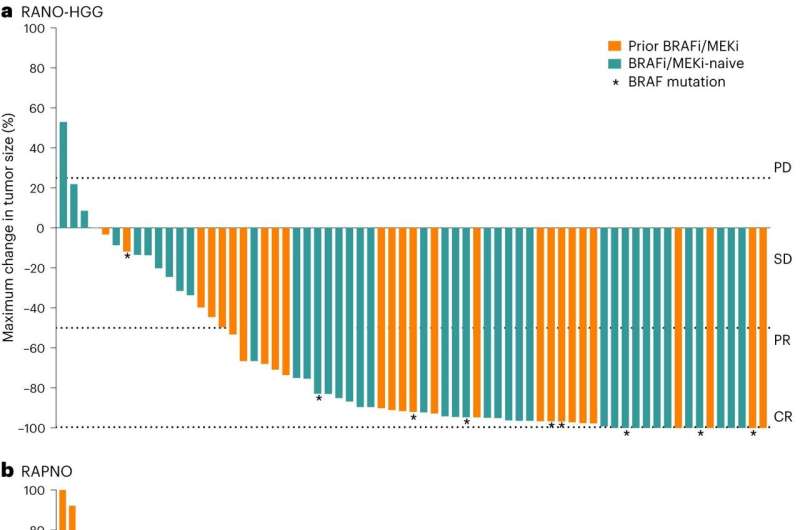This article has been reviewed according to Science X's editorial process and policies. Editors have highlighted the following attributes while ensuring the content's credibility:
fact-checked
peer-reviewed publication
trusted source
proofread
Experimental drug may slow childhood brain tumors

The drug tovorafenib may halt the growth of or shrink some childhood brain tumors, according to a clinical trial published in Nature Medicine.
Pediatric low-grade gliomas make up roughly 30% of childhood brain tumors, according to the National Institutes of Health, and mutations in the BRAF gene are the most common genetic drivers of the tumors.
Some pediatric low-grade gliomas can be cured with surgical removal, but for many children, the location of the tumor makes the cancer inoperable. Children with inoperable tumors often require multiple rounds of chemotherapy or radiation during their first few years of life, according to the American Brain Tumor Association.
In the study, more than 100 young people aged 6 months to 25 years with low-grade brain tumors originating from a BRAF mutation were given a weekly dose of tovorafenib, which works by inhibiting expression of the associated RAF gene. The new drug does not cause paradoxical activation of the BRAF fusions as seen with the first generation of RAF inhibitors, a discovery initially reported by Waanders and her team back in a 2013 study published in the Proceedings of the National Academy of Science.
After a median of three months, 67% of trial participants responded to the drug, according to the study. Tumor volume was significantly reduced in 37% of participants and tumor growth was halted in 26%.
The results of the study suggest tovorafenib may be a good treatment option for many patients with low-grade pediatric gliomas who have not been helped with other treatments, said Angela Waanders, MD, MPH, associate professor of Pediatrics in the Division of Hematology, Oncology, and Stem Cell Transplantation, who was a co-author of the study.
"Beyond response rate, what's important to note is that this is a once-a-week drug, which is different than other similar inhibitors on the market," said Waanders, who is also a member of the Robert H. Lurie Comprehensive Cancer Center of Northwestern University.
"Other inhibitors often need to be taken on an empty stomach, once or twice a day, which means nothing to eat or drink a few hours before taking the drug for pediatric patients, but tovorafenib doesn't require that. From a quality-of-life standpoint, that makes tovorafenib an attractive option."
The most common side effects reported were hair color changes, elevated creatine phosphokinase and anemia, according to the study.
After the initial Phase 2 trial closed, the company provided an expanded access program which made it easier for investigators at the Ann & Robert H Lurie Children's Hospital of Chicago to make the drug available to out-of-state patients, Waanders said.
"Equity of access is really important to us, and we were able to provide this drug to patients in the Chicagoland area as well as patients residing in nearby states," Waanders said.
Moving forward, other trials are planned or have opened that will combine this drug with other therapies, such as immunotherapy for BRAF mutant pediatric brain tumors, Waanders said.
Following the trial, tovorafenib is awaiting FDA approval.
More information: Lindsay B. Kilburn et al, The type II RAF inhibitor tovorafenib in relapsed/refractory pediatric low-grade glioma: the phase 2 FIREFLY-1 trial, Nature Medicine (2023). DOI: 10.1038/s41591-023-02668-y

















